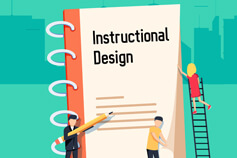 Read more here
Read more here

Certified Instructional Design Practitioner
DATE
2024-09-27;
LOCATION
To Be Determined;
Why Attend?
The most effective kinds of learning initiatives are those which are meticulously designed to bridge performance gaps and consequently, impact business results. Attending this course will allow you to experience a hands-on approach to instructional design principles implemented in a business environment. This course aims at translating learning theories into customized action development initiatives. This allows learners to improve, provides instructors with focus while delivering learning, and eases the job for training and development professionals to recommend best learning solutions. The course is extremely practical mainly aiming at making you highly skillful in every aspect and phase of instructional design.
 Course Objectives
Course Objectives
-
This Course Objective Hasn't Been Provided Yet
 Target Audience
Target Audience
This course is targeted at trainers, instructional designers, training and development professionals, talent management and organization development professionals, and HR practitioners who would like to specialize in instructional design.
- Introduction to instructional design
- The 8 components of an intentional learning space
- The teacher-learner continuum
- Attributes of learner-centered learning space
- Action learning theory
- Definition of instructional design
- Principles of instructional design
- An overview of ADDIE – a step-by-step guide to instructional design
- Analyze
- Design
- Develop
- Implement
- Evaluate
- Analysis of learning interventions (Phase 1)
- Objectives of the analysis phase
- Challenges instructional designers face during analysis
- Validating performance gaps
- Determining instructional goals
- Analyzing learners
- Identifying available resources and potential delivery systems
- Nine-step cost estimation process
- Composing a project management plan
- Designing the learning roadmap (Phase 2)
- Objectives of the design phase
- Drawing the learning “line of sight”
- Building learning/performance task inventory – the essential tasks required to accomplish the instructional goals
- Composing performance objectives
- Developing a set of testing items
- Generating testing strategies
- Setting criteria for calculating return on investment
- Developing learning content (Phase 3)
- Objectives of the development phase
- Generating learning content
- Understanding Instructional Strategies
- Effectively developing beginning, middle, and ending activities
- Developing learning media for all types of learners
- Developing learner study material
- Developing instructor study material
- Setting learning solutions for successful implementation (Phase 4)
- Objectives of the implementation phase
- Identifying potential instructors
- Preparing the instructor for facilitating the learning
- Train-the-trainer as an implementation strategy
- Prepare the learner
- Identifying suitable candidates
- Effective scheduling of learning
- Pre-learning communication with learners
- Tracking learners participation tools
- Designing evaluation metrics and tools for learning programs (Phase 5)
- Objectives of the evaluation phase
- Determining evaluation criteria
- Kirkpatrick four levels of evaluating learning
- 15 evaluation tools and how to choose the best
- Developing an evaluation plan
- Conducting effective evaluation
- Analyzing learning data for continuous improvement

Join Our Community